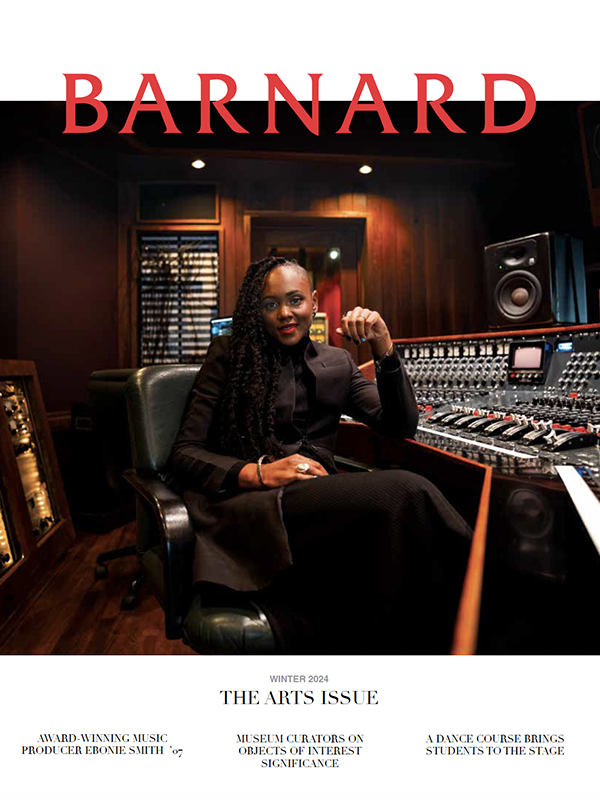The key to career success for women in science boils down to three factors, according to several dozen alumnae gathered for “On the STEM Trail,” one of this year’s Reunion panels: receiving encouragement from a young age, gaining confidence to overcome gender bias in fields dominated by men, and being mentored in high school, college, and beyond.
A multigenerational panel of three distinguished alumnae in science assembled in Barnard Hall’s Held Auditorium to talk about their career paths. Most of the audience members were also working in or retired from positions in science, technology, engineering, and mathematics. Sonia Ortiz ’08, a chemistry major at Barnard and now an analytical chemist at Novartis in Boston, moderated the discussion.
All three panelists said they knew at a young age they wanted to be scientists.
Saralyn Mark ’83, an endocrinologist, geriatrician, and women’s-health specialist, said her childhood goal in the late 1960s was to be a doctor and an astronaut, although she had no idea that women were not admitted to the space program at that time. During the admissions process, Barnard representatives told her, “We’ll get you there.” Mark said, “That was like candy to a child.” She eventually became NASA’s first senior medical advisor and a finalist for NASA’s astronaut program; currently, Mark is president of medical-consulting firm SolaMed Solutions, and an adjunct associate professor at Yale and Georgetown universities’ medical schools.
Physics major Bonnie Fleming ’93 is now an associate professor of physics at Yale. She said her hunger for upper-level science classes at her girls’ high school led her to take classes at the adjacent boys’ campus, the only place they were offered. But when she came to Barnard, she found the science classes she wanted. “I’m a physicist, a scientist, because of Barnard—absolutely,” she said. Fleming worked at Fermi National Accelerator Laboratory in Illinois before joining the Yale faculty in 2004, where she conducts research in particle physics and studies neutrinos.
Tiffany Mills ’03, also a physics major with a BS in mechanical engineering from Columbia, manages a group of scientists and engineers for the U.S. Army Armament Research, Development and Engineering Center (ARDEC) in New Jersey; previously, she worked for a company leading tests of remotely operated weapons systems for the army. Mills knew as a teenager that she wanted to study science, but didn’t know what kind. She said the “3-2 program,” which allows Barnard students to earn a BS in engineering at Columbia, was perfect for her. “Through Barnard, I found amazing internship programs and got to explore science,” she said. “The most important thing was exploring all the different paths I could take.”
Ortiz asked the panelists how they overcame gender-bias in their fields; each said she had faced challenges as a woman in a scientific field.
Mark said she rarely saw gender-based discrimination in hospitals, but sees it in the business world. “I try to be as competent as possible, and use humor to defuse the situation,” Mark said. “I have to be on my toes all the time, and when I do see it, at this age, I call them out on it.”
Fleming noticed gender-bias later in her career. “Twice in job interviews I have been asked if I will have children,” Fleming said. “I said ‘no,’ which was a lie. I have three children.” Mills followed up, adding that in the military workplace it’s important as a woman to “control emotions and stay level. In my area, we just try to act like a man.”
The panelists said the Barnard environment had helped them overcome gender discrimination. Mark said, “At Barnard, you are being fed the tools to navigate the world.” Fleming noted, “Barnard gave me a lot of confidence, which is key for women in science to succeed.”
With input from the audience, the discussion moved toward how to encourage more women to follow the STEM path. Everyone agreed that mentorship is an important ingredient. “Passion alone is not going to get you there,” said Fleming. “I do my best at Yale to encourage women in science. We bring in middle-school girls to show them that science is fun and that they can do science.”
Mark said when mentoring young women in STEM, it’s important to demonstrate how their skills can translate to many career paths, “so they don’t feel pigeonholed at the age of 17.” Mills stressed staying connected with other women in these areas, saying she found her job through the Society of Women Engineers. “Networks are critical to the success of women in these fields,” she affirmed.
Both Mills and Fleming believe the small student-teacher ratios in Barnard STEM classes were important to them. “The 3-to-1 student-advisor ratio is the best-kept secret at Barnard,” said Mills. “You have the professors at Barnard who are integrated into your life. At Columbia, I was one of thousands.”
“Numbers make a huge difference,” concluded Fleming. “I had the advantage of a small college and a large university,” and being able to take advantage of both opportunities is a boon to STEM students.
